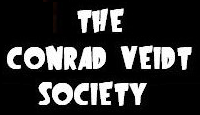
|
|
Conrad Veidt on Asta Nielsen
(He made two movies with her - Der Reigen and Der Kurfurstendamm.)
| I thoroughly enjoyed working in films with Asta Nielsen. Always while working in motion pictures, I missed that sense of 'live' reaction with an audience that I felt while acting on stage in a theater. That most stimulating factor of the theater is lacking, namely, the interaction and fluidity of a living audience. When I was in a play in a theater, and all was going well on stage, I felt that the audience and I were somehow joined into one. This is much different in a film studio, standing in front of a camera. But with Miss Nielsen, I could almost feel that I was on a real stage again. She was an actress whose strong fluidity as a female stage partner made up for the lack of a public audience. The right partner in a film is equal to half the audience!" |
ESP - Medium
| Veidt believed in extra-sensory perception (as did other actors such as Vincent Price). Veidt said, ''For what is it that matters in the final outcome? It is suggestion. I am a convinced spiritualist and a very good medium, and ever since my youth I have known what the power of suggestion can do. In my life it has been able to do everything, both artistic and human. I put the utmost heart and soul into things and I know that a great deal of my success is due to this. That is the reason, for instance, why such a great part as Cesare in The Cabinet of Dr. Caligari excited me so much.''
|
Prayer
| Raised as a Protestant, he believed strongly in the value of prayer. ''I believe we should all pray more, because when we pray, we always pray for something good.''
|
On acting
| 1) The German writer Paul Ickes wanted assistance in preparing Veidt's biography. ''What use is there for a biography of myself? I'm just a movie actor.''
2) In a press interview, ''I have no illusions about my art. I am what the public made me and, consequently, I am not likely to forget my debt to them." and, "I am but a poor player that struts and frets his hour on stage and then is heard no more.'' [He's quoting Shakespeare there].
Veidt was a ''quick study,'' and unlike most actors, frequently learned his part for the entire film, rather than just studying his lines for the day. He often had his lines memorized before filming began. Then during filming, if scenes were delayed or substituted, he would be ready to do a new scene without unnecessary delay. This helped Veidt immerse himself completely in his role.
''It is my greatest joy to live a really good part, even though it imposes great strain. An artist is tired but proud when he has created a great work of art. So it is with the actor who really lives a great role and is proud of the part he played.''
On Under the Red Robe
Veidt to an interviewer- ''In this film I am doing something I've wanted to do since I began acting twenty-five years ago. I've wanted to play a dashing, adventurous role, with fights and excitement. But I was not permitted to do those parts before. I was always in those very sinister parts. I love playing those villainous roles, too, of course. But those roles are mostly mental. But in Under the Red Robe, I fight with swords, I swim a river, and ride a horse. I am always fighting duels at the slightest provocation. I don't mind what risks I take. I tell you, I am enjoying myself immensely!''
|
Conrad Veidt and Madame Tussauds
| Conrad took his daughter to see Madame Tussauds Wax Museum. Viola related to an interviewer her fear at the Chamber of Horrors there, especially the exhibit of Marie Antoinette in which the doomed Queen's head fell, under the axe of the executioner, when the wax figure tableux was activated. In another section, the British Royal family were displayed. The princesses Elizabeth and Margaret were displayed. Viola excitedly told her father that she and Lily had seen the real life versions shopping at Selfridges with their grandmother, Queen Mary, a few days before.
In a corner far removed from the main exhibit of the British Royal family were figures of the Duke of Windsor and his bride, Wallis Simpson, in her blue wedding dress. Conrad mentioned to Lily that even in a wax museum, these two figures were ostracized by the British royal house.
|
Conrad Veidt on his stage work
| I was never a villain on the stage. I always played strong, sympathetic types. My first stage role with a speaking part, believe it or not, was as a priest. It wasn't until I began acting in films that the producers and directors saw me primarily as a bizarre villain. I was happy and content to play either 'the good guy' or 'the bad guy' as they say in American slang, as long as the role and the screenplay called for plenty of dramatic conflict and emotional expression.
|
Emil Jannings on making movies
| "I think the motion picture industry is a stupid business and I despise acting the scenes in short snatches, one at a time. I hate this film work. I am disgusted with myself. On the stage I could never play a part unless I felt it with all my heart and soul."
|
|
This redesign sponsored by:

|



